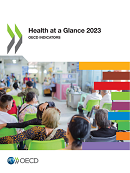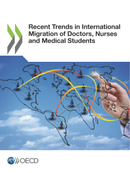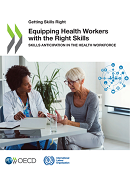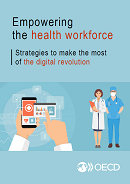Politiques et données sur la santé
Personnels de santé
|
Les personnels de santé sont essentiels pour assurer l'accès à des soins de haute qualité à toute la population. L'OCDE conseille les pays sur la manière de répondre à la demande future de professionnels de santé et sur la façon de gérer l'offre de travailleurs en santé, en passant en revue les politiques relatives à l'éducation et à la formation, au développement professionnel continu, à la répartition géographique et à l'immigration. L'OCDE évalue également les changements dans le champ des pratiques des fournisseurs de soins de santé et l'impact que ces changements pourraient avoir sur l'accès, la qualité et l'efficacité dans la prestation des services de santé. |
 |
NOS DERNIERS RAPPORTS SUR LES PERSONNELS DE SANTÉ
 |
Panorama de la santé 2023 : Les indicateurs de l'OCDE Paru le 7 novembre 2023 en anglais - version française disponible sous peu Le chapitre sur le personnel de santé du Panorama de la santé 2023 (chapitre 8) passe en revue les données les plus récentes sur l’offre et la rémunération des médecins et personnel infirmier dans les pays de l’OCDE. Ce chapitre présente également les dernières tendances en matière de nouveaux diplômés des programmes de formation médicale et infirmière, montrant que le nombre de nouveaux diplômés a augmenté dans la plupart des pays. Il présente également les dernières tendances concernant le nombre de médecins et de personnel infirmier formés à l'étranger travaillant dans les pays de l'OCDE, en soulignant que le nombre et la part de médecins et de personnel infirmier formés à l'étranger ont augmenté au cours de la dernière décennie dans plusieurs pays, ce qui indique que la croissance de la demande intérieure de médecins et d’infirmiers a dépassé l’offre intérieure. |
|
Equipping Health Workers with the Right Skills: Skills Anticipation in the Health Workforce Paru le 15 décembre 2022 - disponible uniquement en anglais The COVID-19 pandemic further exacerbated the long-standing skills shortages in the health workforce across countries. Equipping health workers with the right skills is essential to respond to future health crises, to prepare for increasing use of digital technologies, and to plan for demographic change. This joint report by the OECD and ILO aims to enable more resilient health workforces by helping countries to assess future demand in terms of both numbers of health workers and skills needs, and to prepare appropriate policy responses. The report provides a comparative overview of practices in 16 countries to anticipate future skill needs in the health workforce, and of how such information is used by policy makers and social partners to foster a better alignment with labour market needs. Analysis is based on interviews with institutions that are responsible for anticipating skill needs in the health workforce, a virtual peer-learning workshop and desk research. |
|
|
Empowering the health workforce - Strategies to make the most of the digital revolution Paru le 11 novembre 2020 - disponible uniquement en anglais Digital technologies offer unique opportunities to strengthen health systems. However, the digital infrastructure, interoperability standards, and data sharing only provide the tools, which on their own cannot transform the health systems, but need to be put to productive use by the health workers.
This report was prepared for the 2020 German Presidency of the Council of the European Union and with support from the German Federal Ministry of Health. It was released at the conference “Digital Health 2020 - EU on the Move", organised on 11 November by the German Federal Ministry of Health. |
 |
Recent Trends in International Migration of Doctors, Nurses and Medical Students Paru le 25 juillet 2019 - disponible uniquement en anglais
|
PUBLICATIONS SUR LES PERSONNELS DE SANTÉ
- Fewer young people want to become nurses in half of OECD countries (mai 2024)
- Are working environments for healthcare workers improving? (avril 2024)
- Advanced practice nursing in primary care in OECD countries, Document de travail No. 165 (avril 2024)
- OECD Report on Medical Education and Training in Israel - Towards a better governance structure for health workforce planning and policy-making in Israel (juin 2023)
- The COVID-19 Pandemic and the Future of Telemedicine (janvier 2023)
- Equipping Health Workers with the Right Skills: Skills Anticipation in the Health Workforce (décembre 2022)
- Empowering the health workforce to make the most of the digital revolution, Document de travail No. 129 (juillet 2021)
- International migration and movement of doctors to and within OECD countries - 2000 to 2018, Document de travail No. 126 (février 2021)
- International migration and movement of nursing personnel to and within OECD countries - 2000 to 2018, Document de travail No. 125 (février 2021)
- Skills for the future health workforce - Preparing health professionals for people-centred care, Document de travail No. 124 (février 2021)
- Recent Trends in International Migration of Doctors, Nurses and Medical Students (juillet 2019)
- Feasibility Study On Health Workforce Skills Assessment - Supporting health workers achieve person-centred care (février 2018)
- Nurses in advanced roles in primary care - Policy levers for implementation, Document de travail No. 98 (novembre 2017)
- Health Workforce Policies in OECD Countries: Right Jobs, Right Skills, Right Places (mars 2016)
- Nouvelles tendances des migrations internationales de médecins et d'infirmiers vers les pays de l'OCDE, chapitre 3 des Perspectives des migrations internationales 2015 (septembre 2015)
- Wage-setting in the Hospital Sector, Document de travail No. 77 (septembre 2014)
- Geographic Imbalances in Doctor Supply and Policy Responses, Document de travail No. 69 (avril 2014)
- Health Workforce Planning in OECD Countries: A Review of 26 Projection Models from 18 Countries, Document de travail No. 62 (juin 2013)
DONNÉES SUR LES PERSONNELS DE SANTÉ
Pour accéder à toutes nos données sur les personnels de santé, allez dans le dataset Ressources en santé dans OECD.Stat.
|
Panorama de la santé 2023 Chapitre sur le personnel de santé dans Panorama de la santé 2023 - Les indicateurs de l'OCDE :
|
Health at a Glance - Europe 2022 Données sur les personnels de santé dans Health at a Glance: Europe 2022 - State of Health in the EU Cycle :
Health at a Glance - Asia/Pacific 2022 Données sur les personnels de santé dans Health at a Glance - Asia/Pacific 2022 : |
WORKING FOR HEALTH
 |
Working for Health est un programme conjoint de l'Organisation internationale du travail (OIT), de l'Organisation de coopération et de développement économiques (OCDE) et de l'Organisation mondiale de la santé (OMS), créé en 2017 pour mettre en œuvre des actions mesurables en faveur du plan d'action Working for Health action plan on health employment and inclusive economic growth. Le Plan d'action a été approuvé et adopté par l'Assemblée mondiale de la santé et salué par les organes directeurs de l'OIT et le Comité de la santé de l'OCDE. Le programme Working for Health contribue à faire progresser la couverture sanitaire universelle et à avancer vers la réalisation des objectifs de développement durable 3, 4, 5 et 8 (santé, éducation, égalité des sexes, travail décent et croissance économique). Le programme a donné lieu au développement de la Plateforme internationale sur la mobilité des agents de santé et l'échange de données inter-agences (IADEx). De plus amples informations sur le programme Working for Health sont disponibles sur le site internet de l’OMS Working For Health. |
LECTURES COMPLÉMENTAIRES
- Lire notre dernier rapport Who Cares? Attracting and Retaining Care Workers for the Elderly (juin 2020)
- Publications sur la santé
NOUS CONTACTER
- Mr. Gaetan Lafortune : gaetan.lafortune@oecd.org
 Nous suivre sur Twitter @OECD_Social
Nous suivre sur Twitter @OECD_Social
Documents connexes

